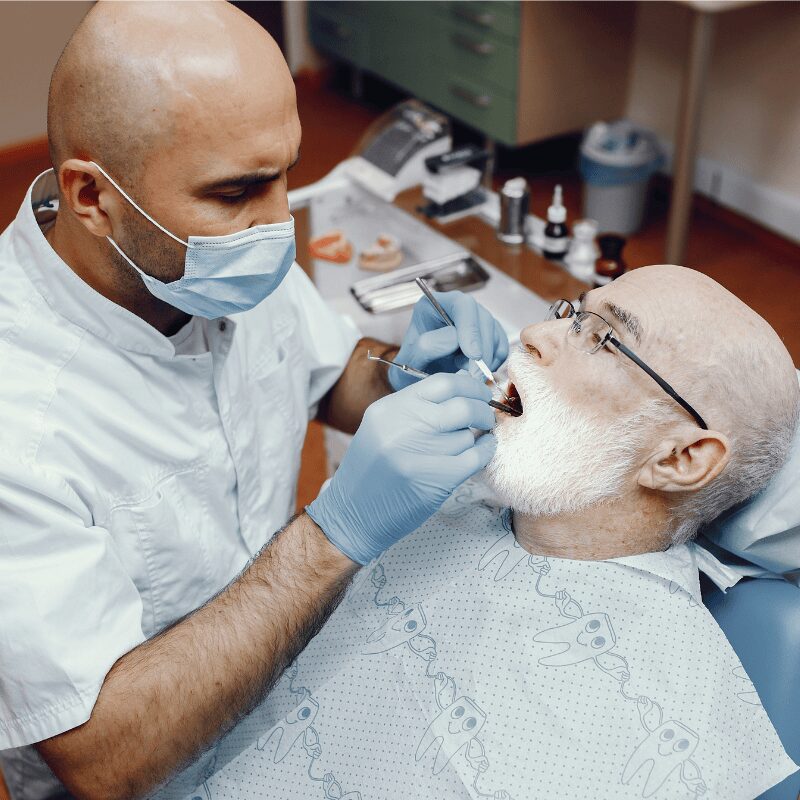Oral cancer treatments can profoundly impact dental health, often resulting in issues such as tooth decay, jawbone changes, and dry mouth. Restorative dentistry plays a critical role in recovery, helping survivors regain both dental health and confidence in their smiles. At Advanced Dental Care of Indiana, we specialize in providing comprehensive restorative options tailored to meet the unique needs of survivors who have undergone treatment for oral cancer. Our goal is to restore your oral health and improve your quality of life through professional care and advanced dental treatment solutions.
Understanding the Effects of Oral Cancer Treatment on Dental Health
Common Dental Problems After Oral Cancer
The aftermath of oral cancer treatment can usher in a host of dental health challenges, marked by an intricate interplay of symptoms that profoundly affect one’s quality of life. Treatments like radiation and chemotherapy, while pivotal in combating cancer, often leave behind a trail of oral health issues. According to Research, oral cancer treatments can significantly diminish salivary gland function, leading to xerostomia (dry mouth), which exacerbates tooth decay and can lead to rampant caries if not managed promptly.
If you are interested to learn what oral cancer looks like, then read our previous blog.
Tooth loss and decay are not merely consequences of reduced saliva; they are also frequently accompanied by changes in the jawbone’s structure, a condition known as osteoradionecrosis. This can occur when radiation disrupts the blood supply to the jawbone, making it more prone to injury and less capable of healing. Research highlights the prevalence of such complication among head and neck cancer survivors, underscoring the critical need for proactive dental care strategies.
These dental complications—ranging from the mundane to the severe—are not insurmountable. Understanding their nuances and underpinnings can guide survivors towards effective management strategies. This awareness is vital, as maintaining oral health post-treatment is not only about restoring aesthetics and function but also about preventing further complications that could jeopardize one’s recovery and overall health.

Overview of Treatment Types and Their Impacts
Oral cancer treatments—surgery, radiation therapy, and chemotherapy—each uniquely alter dental health. Surgery can physically reshape the mouth, while radiation often reduces salivary flow, increasing decay risk. Chemotherapy’s cytotoxic effects can weaken oral tissues, necessitating specialized dental care to manage and mitigate these diverse impacts effectively.
What is Restorative Dentistry?
Restorative dentistry aims to repair and restore the function and aesthetics of your teeth and gums. Our team focuses on treatments that replace missing teeth with dental implants, repair damage, and correct imperfections, ensuring not only a healthier mouth but also a more appealing smile. Its dual goals are to enhance oral functionality and boost aesthetic appeal, contributing significantly to overall dental health and self-confidence.
At Advanced Dental Care of Indiana, our team focuses is on revitalizing the oral health of individuals who have undergone oral cancer treatments. By replacing lost teeth, reconstructing damaged structures, and addressing aesthetic concerns, we aim to enhance both the functionality and appearance of your mouth, ensuring a return to normalcy and confidence in your daily life.
Common Procedures in Restorative Dentistry
Restorative dentistry encompasses several key procedures that are vital for recovering the oral health of individuals, especially those who have survived oral cancer. Dental implants provide a durable, long-term solution for missing teeth, mimicking natural tooth roots and supporting artificial teeth. Bridges and crowns bridge gaps and restore damaged teeth, respectively, enhancing both function and appearance. Dentures, both full and partial, offer a removable option for extensive tooth loss.
For oral cancer survivors, these treatments require special considerations such as ensuring adequate bone health for implants and careful planning to accommodate changes in oral structures. These procedures are critical in helping survivors regain not just functionality but also confidence in their smiles.
Oral Rehabilitation with Dental Implants After Cancer Treatment
Suitability for Implants
For oral cancer survivors, oral rehabilitation is usually the primary course of action. Therefore, assessing the suitability for dental implants is crucial. Research suggests that there is a 95% success rate of dental implants among survivors. Post-treatment bone health is a primary concern; radiation therapy may compromise jawbone density, necessitating a thorough evaluation by a dental specialist.
The timing for implant placement also requires careful consideration. Ideally, implants should be placed once healing has sufficiently progressed and any potential complications from treatment have been addressed.
At Advanced Dental Care of Indiana, we conduct comprehensive assessments to ensure that each implant procedure is timed perfectly, maximizing the likelihood of success and helping survivors restore not just function, but also quality of life.
Process and Benefits
The process of placing dental implants involves several key steps: initial assessment, bone preparation, implant insertion, and fitting the artificial teeth. This procedure offers substantial long-term benefits for oral cancer survivors, including improved chewing function and speech, preservation of facial structure, and a high success rate that contributes to overall life quality. Implants are a durable solution, seamlessly integrating with jawbone tissue to provide a stable and aesthetic restoration that can dramatically enhance a patient’s confidence and daily interactions.
Dental Management of Patients Post Head and Neck Cancer
Immediate Post-Treatment Care
After head and neck cancer treatment, immediate dental care is critical to manage side effects and prevent complications. Side effects such as dry mouth, mucositis, and altered taste can significantly impact dental health, making early intervention essential. This includes regular dental check-ups, specialized mouth rinses to manage dryness, and tailored oral hygiene routines to prevent decay and gum disease.
Proactive dental management helps mitigate the risks of severe infections and additional oral deterioration, ensuring cancer patients maintain the best possible oral health as they recover from their cancer treatments.
Long-term Dental Care Strategies
Long-term dental care for head and neck cancer survivors involves vigilant surveillance of the oral cavity for signs of recurrence and comprehensive preventive care. Regular dental exams and oral cancer screenings are crucial, as they allow for the early detection of new or recurring issues. Implementing a preventive care routine, including professional cleanings and patient education on oral hygiene practices, is essential to maintain overall oral health and mitigate future complications.
Comprehensive Dental Restoration Options
Overview of Options
In restorative dentistry, survivors of head and neck cancer have various options tailored to their specific needs. Implants offer a permanent solution mimicking natural teeth, while bridges and crowns repair or replace sections of teeth, and dentures provide a removable option for extensive tooth loss. Choosing the right solution involves a detailed assessment of each patient’s oral health status and functional needs.
Innovative Materials and Methods
Advancements in materials and methods enhance these treatments further. Today’s restorations use bio-compatible and durable materials that integrate seamlessly with the body, reducing the risk of rejection and promoting long-term success. Aesthetic advancements also ensure that these restorations not only feel but also look natural, greatly enhancing the patient’s self-esteem and quality of life. Together, these innovations allow for more personalized and effective treatment plans, ensuring each patient receives the best possible outcome.
Preparing for Restorative Dental Work
Consultation and Evaluation
Embarking on restorative dental work starts with a detailed consultation and evaluation. Your initial visit will assess the impacts of cancer treatment on your oral health, setting the stage for personalized care. We’ll examine your dental and medical history to tailor treatments that meet your specific needs.
Planning Your Treatment
The planning of your treatment is crucial. It involves customizing the types of restorative procedures you need, and scheduling them in an order that maximizes healing and effectiveness. This meticulous planning ensures that every step supports your overall recovery and leads to the best possible outcomes for your dental health and well-being.
Life After Restoration
Maintaining Dental Health Post-Restoration
Life after dental restoration marks a new beginning. Maintaining your dental health involves diligent daily care and hygiene practices, coupled with regular check-ups to ensure the longevity of your restorative work. These habits are essential for preventing future dental issues and preserving the work done.

Long-term Outcomes and Quality of Life
The long-term outcomes of restorative treatment can significantly enhance your quality of life. Patients often experience improved functionality, aesthetics, and an overall boost in confidence. Testimonials from those who have undergone similar treatments echo these benefits, sharing stories of restored smiles and renewed zest for life, underscoring the transformative impact of restorative dentistry.
Conclusion
In a nutshell, restorative dentistry plays a pivotal role in the lives of oral cancer survivors, offering them the chance to regain both function and aesthetics in their smiles. We encourage anyone who has undergone such treatments to consult with a specialist to explore tailored restoration options. Take the first step towards a renewed smile and improved quality of life by scheduling a consultation with Advanced Dental Care of Indianapolis today. Call (317) 926-5200 for Indianapolis, (317) 485-7000 for Fortville, (765) 622-7000 for Anderson dental offices. Let us help you navigate your post-cancer dental care journey.

